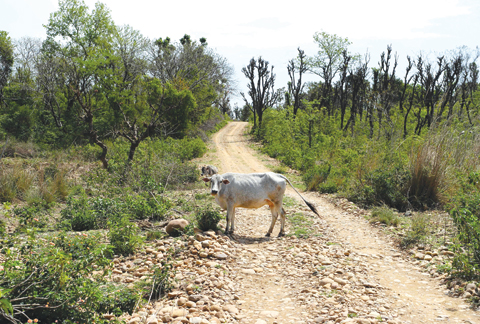 KASHMIR: A cow grazes along a path leads to the house of the eight-year-old girl, who was raped and murdered, at Rasana village in Kathua district of Jammu yesterday. - AFP
KASHMIR: A cow grazes along a path leads to the house of the eight-year-old girl, who was raped and murdered, at Rasana village in Kathua district of Jammu yesterday. - AFP
BANGKOK: The brutal rape and murder of an eight-year-old girl in India, that has triggered massive protests, highlights nomadic tribes' vulnerability and lack of land rights, activists said. According to the police, the girl was kidnapped, gang raped and killed in the northern state of Jammu and Kashmir as part of a plot by Hindu residents to evict her nomadic Bakkarwal community from a village where they had temporarily settled.
Nearly 2 million people in the state belong to the Muslim Bakkarwal and Gujjar ethnic groups who traditionally spend the summer months in mountain pastures, and winters on the plains with their cows, sheep and horses. They have sparred with Hindu villagers in recent years over their shrinking access to grazing and forests, said Javaid Rahi, a tribal activist in Jammu.
"Their biggest problem is the lack of land rights," he told the Thomson Reuters Foundation. "They are being seen as encroachers on lands they have lived on for centuries. Where can they go? Even a burial ground was denied to the child because their right over it was disputed." Nearly 40 percent of Gujjars and Bakkarwals in the state have given up migration because of land disputes and are now impoverished, said Rahi. Indigenous people in India are protected by several laws that acknowledge their way of life, including customary rights to land. But these rights are often disregarded as demand for land for industry increases, activists say.
Restive Jammu and Kashmir's constitutional "special status" a provision that allows the state to make its own laws - has kept it from implementing the Forest Rights Act, which gives indigenous people the right to inhabit and live off forests. State chief minister Mehbooba Mufti has said a tribal policy is being drafted, and that nomadic tribes cannot be evicted without government permission. But elsewhere too, lands of indigenous people are becoming increasingly contentious. In northeastern Arunachal Pradesh state, individual ownership rights to tribal communities can trigger more conflicts, analysts say.
Conservationists have also criticized the slow progress of the Forest Rights Act and a move to promote commercial plantations. "Land rights are precarious for forest dwellers across the country, and the Bakkarwals have to cope with many layers of disadvantage," said Anita Sharma, a sociologist who has studied the community. "The relationship of the pastoral nomad with settled populations has changed drastically, owing to the continued marginalization of the pastoralist. The migration of the nomad is increasingly viewed as an indulgence."- Reuters

